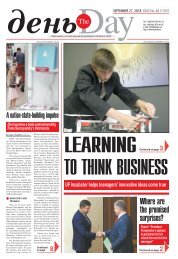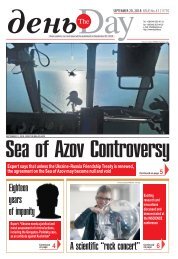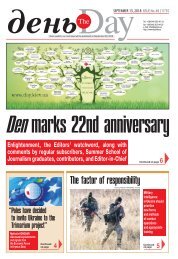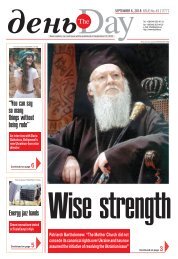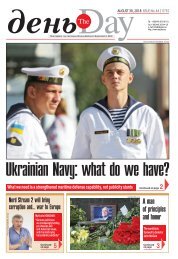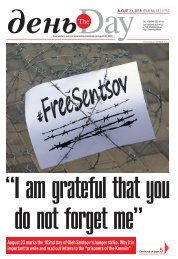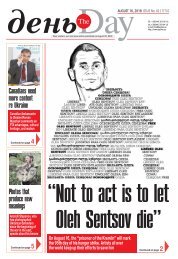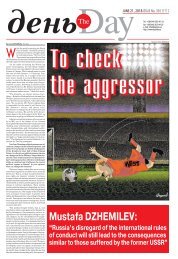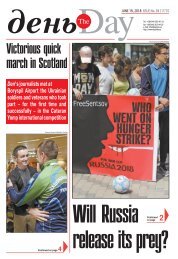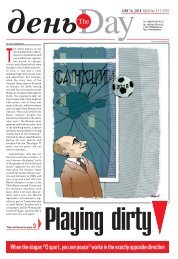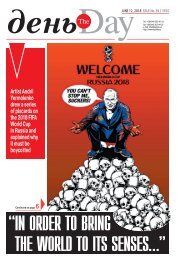41_1-8
Create successful ePaper yourself
Turn your PDF publications into a flip-book with our unique Google optimized e-Paper software.
8<br />
No.<strong>41</strong> AUGUST 9, 2018<br />
TIMEO U T<br />
WWW.DAY.KIEV.UA<br />
By Dmytro DESIATERYK, The Day, Odesa – Kyiv<br />
“Where disinformation is named, it does not exist.<br />
Where it exists, it is not named.”<br />
This statement of French culturologist and<br />
philosopher Guy Debord could be used as epigraph to<br />
Serhii Loznytsia’s new film Donbas.<br />
Only one of this picture’s 13 novellas is not set in<br />
the occupied territories. The rest portray the bloody<br />
humdrum routine of “Novorossiya” (“New Russia”) in<br />
a fictional eastern Ukrainian town (the film was shot<br />
in Kryvyi Rih). Yet the film is not so much about the<br />
“Russian World” itself as about its main weapon –<br />
propaganda, whose mechanisms Loznytsia analyzes<br />
with characteristic mercilessness.<br />
● MANIPULATIONS<br />
This begins with the first scene. A<br />
burly talkative woman (Tamara Yatsenko)<br />
argues the makeup artist in<br />
the film crew van. In the next scene,<br />
she and actors, disguised as<br />
chance passers-by on the<br />
street, will have to pose as<br />
“eyewitnesses” of enemy shelling<br />
against the background of the previously<br />
blown-up trolleybus and car.<br />
There is a now popular term – posttruth<br />
– to describe what “Novorossiya” propagandists<br />
do. Although it appeared as far back<br />
as 1992, it became particularly topical in 2016 during<br />
Donald Trump’s election campaign and the UK<br />
Brexit referendum. At that very time, Oxford Dictionary<br />
named post-truth as word of the year, defining<br />
it as follows: “Relating to or denoting circumstances<br />
in which objective facts are less influential in<br />
shaping public opinion than appeals to emotion and personal<br />
belief.”<br />
Post-truth is being spread by the mass media and<br />
Internet social networking sites, and it is filled with<br />
the last century’s major mythologemes. Trump has<br />
“Make America Great Again,” in the case of Russia and<br />
the Donbas it is the cult of victory (“victory hystreria”),<br />
the great USSR, Orthodoxy, struggle against “fascism”<br />
(when ethnic origin alone is enough for one to be branded<br />
as fascist), and political paranoia (enemies are all<br />
around). Reality is twisted in slogans. Time and<br />
space lose integrity in this warped reference frame, human<br />
lives serve as consumables, and a leader or a boss<br />
substitutes the hero. For this reason none of the stories<br />
can finish and, accordingly, Donbas is structured<br />
fragmentarily.<br />
In each new scene, manipulation becomes more<br />
brazen and masterly. At the maternity home, blabbermouth<br />
Mykhalych (Borys Kamorzin) makes a show<br />
for white-smocked women extras, demonstrating the<br />
foodstuffs and medicines hidden in the office room of<br />
a thievish director – the latter is sitting quietly in the<br />
room next door and will then return the showman’s favor<br />
in the shape of rather a thick envelope. A group of<br />
Mongoloid-faced military keep telling a German journalist<br />
that they are “locals,” but they cannot recall their<br />
village’s name. A Ukrainian prisoner with a nameplate<br />
reading “punishment” is being tied to the post near a<br />
bus stop for a mob trial. A taxi minibus is cut to pieces<br />
by Russian Grad rockets, after which an ambushed hit<br />
squad guns down the separatists’ accompanying vehicle<br />
on a nighttime highway. The prologue troupe is really<br />
killed for the sake of another spot report, as the concluding<br />
credits appear in a static long shot – lies bite<br />
themselves on the tail.<br />
● LITERATURE<br />
Post-truth is literary owing to continuous propagandistic<br />
agitation: footage produces a greater effect<br />
if there is a necessary comment. The three scenes<br />
about “Novorossiya’s” ruling castes show literariness<br />
one way or another.<br />
Visitors, who have brought miracle-working<br />
icons of Churilas Plenkovich and relics of Theodosis<br />
of Kherson, approach the boss, a serious-looking<br />
man with conspicuous tough-guy manners and a virago<br />
secretary. These saints are the film director’s invention<br />
that resembles the Gogolian motif of outlandish<br />
names, which produces almost full namesakes of<br />
Nikolai Gogol’s comedy Marriage in one of the following<br />
scenes of separatists’ wedding ceremony: Ivan<br />
Pavlovich Yaichnitsa (“fried eggs”) and Anzhela<br />
Tikhonovna Kuperdiagina form “the Yaichnitsa couple,”<br />
while Novorossiya MP Oksana Potsyk welcomes<br />
the newlyweds.<br />
The satire with religious travelers, quite in the<br />
spirit of The Government Inspector, gives way to the<br />
flogging of a “Cossack” marauder by his comrades, as<br />
church bells are ringing. It is a clear allusion to Leo Tolstoy’s<br />
short story After the Ball, where a soldier is punished<br />
with the running of a gauntlet on Forgiveness<br />
Anatomy<br />
of post-truth<br />
in Serhii Loznytsia’s<br />
Donbas<br />
The chronicle<br />
of a world<br />
turned inside out<br />
Sunday. But, in contrast to the original<br />
source, there is no reflecting narrator<br />
here because is nobody to sympathize<br />
with. A gloomy irony: butchers scourge<br />
themselves.<br />
All the “new Russian” things are both literary<br />
and ritual: adoration of relics, passage between two<br />
rows of men, and wedding. Bringing life into line with<br />
a prearranged plot and protocol is an integral part of<br />
dictatorship – individuality is not essential, there are<br />
no irreplaceable people, and you can fall victim on the<br />
boss’s whim. This is why those who contrast with the<br />
authorities’ arbitrary rule are not fighters or at least<br />
jesters but sufferers.<br />
They are town residents who hide from shelling<br />
in a damp, dark, and musty basement, and passengers<br />
of the bus separatists stopped at the checkpoint, the<br />
simple-hearted businessman Senia who came to collect<br />
his stolen car from the militants, an old woman who,<br />
instead of laying into the captured Ukrainian “punisher,”<br />
meekly inquires when the bus is coming because<br />
she must go to see her daughter.<br />
Almost everybody has their fair share of humiliations.<br />
An aggressive blonde, the secretary in the scene<br />
with the relics, bursts into the basement to take her<br />
mother to a comfortable house the bandits gave her.<br />
She showers the underground dwellers with brutal obscenities.<br />
Some men are taken from the bus, frisked,<br />
and forced to undress under supervision of the wicked<br />
female commander who spurts out a stream of consciousness<br />
about a “fatherland in danger.” The militants<br />
rob Senia of his car for good and exact a 150,000-<br />
dollar tribute from him.<br />
In every case, people neither keep silent nor resist.<br />
Restrained reactions are in sharp contrast with<br />
theatrical lamentations at the pace of staged attacks,<br />
as well as with the revelry of the “new Russian” crowd<br />
in the scene of the wedding and the hysterical guffaw<br />
in the scene with prisoners of war. However, the literary<br />
motif in the film develops sequentially – to the<br />
proverbial and logical, almost like in The Overcoat,<br />
sympathy with little people. But, in the last analysis,<br />
it is not they but those who rule them who will turn out<br />
to be ghosts.<br />
OlenaStarikova’ssilvermedal<br />
PHOTO FACT<br />
Photo courtesy of the Odesa International Film Festival<br />
● OPTICS<br />
Internet video footage provided material for the<br />
Donbas script. Candid photography in the Internet is<br />
a matter of information, not film making. Accordingly,<br />
Oleh Mutu, who worked in all of Loznytsia’s feature<br />
films, subjects his individuality of a cameraman to<br />
dramaturgy. He is reincarnated as a bouncing TV camera<br />
in the bomb shelter, as a phone in the hands of a<br />
light-minded woman car driver on the road under<br />
shelling, as a motionless observer in very long shots.<br />
This kind of dissociation does not rule out the author’s<br />
ethically clear position – this is the only way to testify<br />
to what eschews testimony and to make real the factory<br />
of unreality.<br />
It is not a document, not a drama, but quite a wide<br />
anatomical table – there can be perhaps no other optics<br />
for the hell of post-truth.<br />
No one has ever suggested this view before.<br />
After the Donbas premiere at the Odesa Festival,<br />
Serhii Loznytsia met Den/The Day’s correspondent.<br />
● “I TRIED TO SHOW VARIOUS ASPECTS<br />
OF THIS OUTRAGE”<br />
How was the film born? Was there any concrete<br />
nuance?<br />
“It is difficult to say how and when ideas emerge,<br />
but do you remember what was going on in this country<br />
four years ago? I closely watched the events and<br />
looked for information in the Internet. Some videos really<br />
struck me. I suddenly wished to work with this material<br />
because it seemed to me that it contained some<br />
very important things that influence our existence. In<br />
peacetime, you live in a routine, no events occur, and<br />
you don’t know the consciousness and subconsciousness<br />
of people next to you and in the neighboring region.<br />
And suddenly these ‘flowers’ blossomed there,<br />
and you get it in this form.”<br />
What exactly was interesting there for you?<br />
“It is the combination of things that usually do not<br />
combine in our mind, when the tragic and the funny,<br />
even the grotesque, simultaneously come side by<br />
REUTERS photo<br />
side. So, it seemed interesting to me to work with this<br />
tragifarce.”<br />
Speaking of grotesqueness, the ironical interpretation<br />
of Donbas is quite a new method for you.<br />
“Yes, it is new. Obviously, I haven’t tackled this<br />
kind of topic or taken on this pattern before. (With a<br />
smile) I may be developing, though.”<br />
What caused a fragmentary structure, without<br />
a recurring character?<br />
“The idea. I strove to describe this space and show<br />
various aspects and manifestations of this outrage, this<br />
feast of disobedience, these Saturnalia, this hell. A recurring<br />
character, a single conflict would only hinder<br />
me. I thought up nothing new. There are similar in cinema.<br />
Luis Bunuel’s Phantom of Liberty and Sergey<br />
Eisenstein’s Strike are illustrative examples. As for<br />
documentaries, I have long been making films where<br />
there is no protagonist but there are masses. It was interesting<br />
to try this form in fictional films. I gathered<br />
13 novellas and managed to combine them with each<br />
other. As it is in Bunuel’s film, a character passes to<br />
an episode, this episode unfolds, then another hero<br />
moves into the next episode – the only thing is that the<br />
audience should not get lost. I’ve already had an almost<br />
similar script of Babyn Yar. I failed to film that script,<br />
but I’ve made Donbas. This structure suggests a<br />
broad view – I get an opportunity to look at society as<br />
a whole and get a general picture.”<br />
It seems to me this form quite fits in with this very<br />
type of events.<br />
“Of course it does.”<br />
What was the most difficult thing in this work?<br />
For you can’t see the documentary footage on which<br />
your script is based without a veil over your eyes – it<br />
draws a too strong emotional response…<br />
“If had a veil over my eyes in the course of work,<br />
I would perhaps have to change profession. But I keep<br />
a certain distance from these events. A few steps aside.<br />
If there is no distance, you will be so much biased that<br />
you won’t be able to say a word. For this reason, I can<br />
watch these clips, they have an impact, of course, but<br />
I cut off my emotional links – it is perhaps just a professional<br />
quality.<br />
“The point is different: as we filmed in Ukraine,<br />
it was difficult to organize the process. I invited department<br />
heads, a cameramen, a sound engineer, an<br />
editor, a line producer from various countries, where<br />
the film industry in very well developed. The director’s<br />
first assistant is a profession that I think does not exist<br />
in Ukraine. Local specialists had to learn administering<br />
and other things on the job. Unfortunately,<br />
there are so far no skills in ethics, working relations,<br />
and decision-making. So, it was not so easy to launch<br />
this process so that the film crew worked like clockwork.<br />
And don’t forget that this crew consists of more<br />
than 100 people. Yet we managed to do so.”<br />
How long did the whole process last?<br />
“We shot this difficult film in 31 days. We had<br />
no funds for a longer time, and I think what we had was<br />
enough. It took us about 3.5 months to prepare for<br />
work. I came to Ukraine on November 2 and left on<br />
March 31. I stayed here on location in Kryvyi Rih except<br />
for New Year’s Day. Otherwise, it was easy. If you<br />
know what you want, work with splendid actors,<br />
know how to work with non-professionals, can find<br />
beautiful places and talented people, the rest is a technical<br />
matter. So, six months were enough for us to complete<br />
the whole cycle.”<br />
Read more on our website<br />
The Ukrainian cyclist has already won a second medal at the summer sports European Championships<br />
The European Championships continue in the<br />
Scottish city of Glasgow. In the track cycling program,<br />
Ukrainian cyclist Olena Starikova won a<br />
silver medal in the 500 meters time trial (an individual<br />
timed race), www.sportonline.ua reports.<br />
This is Starikova’s second silver in these<br />
European Championships.<br />
Earlier, she won silver in the team sprint<br />
event while paired with Liubov Basova. Thus,<br />
the medal count of Ukraine’s team as of the<br />
morning of August 7 included 13 medals, with<br />
4 golds (1 in swimming, 1 in synchronized<br />
swimming, 1 in cycling, and 1 in diving), 8 silvers<br />
(2 in cycling, 1 in rowing, 4 in synchronized<br />
swimming, and 1 in swimming), and<br />
1 bronze (in rowing).<br />
UKRAINIAN NEWS IN ENGLISH<br />
www.day.kiev.ua incognita.day.kiev.ua<br />
FOUNDER AND PUBLISHER:<br />
UKRAINIAN PRESS GROUP LIMITED LIABILITY COMPANY<br />
Published since May 27, 1998.<br />
Свiдоцтво про перереєстрацiю КВ № 21448-11248 ПР<br />
вiд 27 липня 2015 року<br />
Larysa Ivshyna, Editor-in-Chief, Den<br />
e-mail: chedit@day.kiev.ua<br />
Hanna Sheremet, Deputy Editor-in-Chief<br />
Anna Mazurenko, Director,<br />
Ukrainian Press Group LLC<br />
Oksana Sabodash, Editor,<br />
English Language Bureau<br />
Olha Pavliei, Technical Editor<br />
Borys Honcharov, George Skliar, Taras Shulha,<br />
Nadia Sysiuk, Translators<br />
Maryna Khyzhniakova, Proofreader<br />
Marharyta Motoziuk, Designer<br />
Alla Bober, Responsible Secretary<br />
Mykola Tymchenko, Photography Editor<br />
Mailing address: prosp. Peremohy, 121d, Kyiv 03115, Ukraine<br />
Telephone: +38(044) 303-96-19<br />
Fax: +38(044) 303-94-20<br />
Advertising: +38(044) 303-96-20; e-mail: ra@day.kiev.ua<br />
Subscriptions: +38(044) 303-96-23; e-mail: amir@day.kiev.ua<br />
E-mail: time@day.kiev.ua<br />
Subscription index: 40032<br />
Ukrainian Press Group LLC<br />
Code 24249388<br />
Raiffeisen Bank joint-stock company<br />
MFO 380805<br />
A/С 26007478064<br />
Responsibility for the accuracy of facts, quotations, personal names, and other information is borne by the authors of publications and in advertising<br />
materials by the advertiser. The views expressed in signed articles do not necessarily reflect those of the editors. Submitted materials are not returned<br />
and not reviewed. The editors retain the right to edit materials. When citing Day materials, reference to The Day is mandatory. ©Den.



